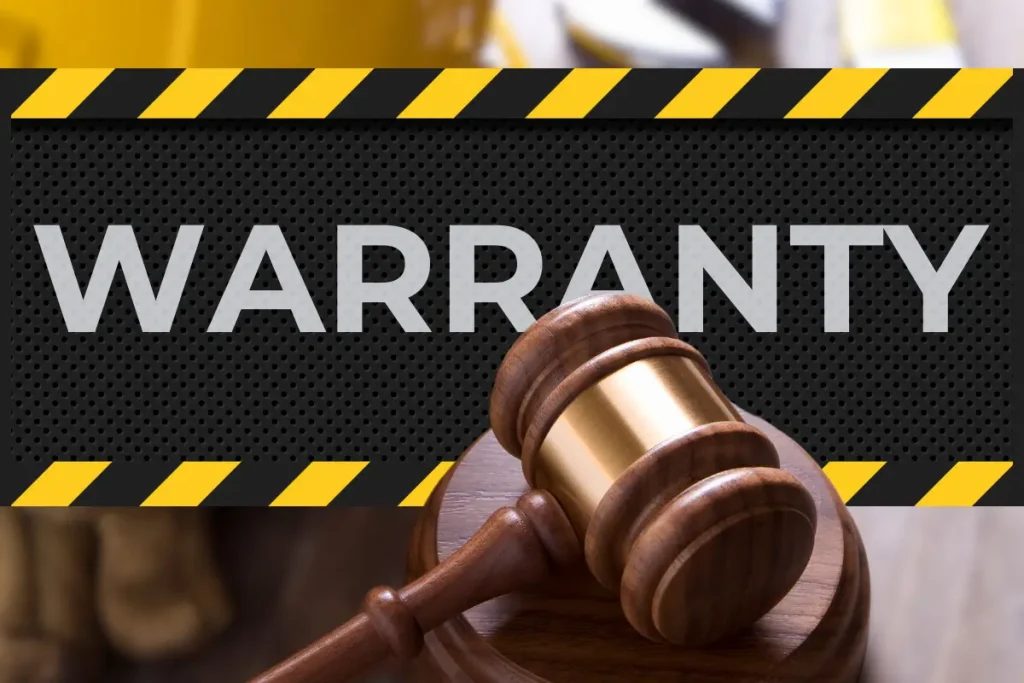When it comes to construction projects, implied warranties are an essential layer of protection that consumers may not always know about. These warranties help ensure that building work meets certain quality standards, even if they aren’t spelled out in a contract. Here’s a breakdown of what you need to know about implied warranties, how they work in construction, and what they mean for you.
What Exactly Are Warranties?
At its core, a warranty is an assurance from a seller or service provider that a product or service meets specific standards. Warranties lay out what you can expect in terms of quality and performance, as well as what remedies are available if something goes wrong. If an item or service doesn’t live up to the promised quality, a warranty usually covers repairs, replacements, or refunds.
Implied Warranties in Construction: A Closer Look
In construction, implied warranties act as built-in guarantees for the quality of work and materials, even if they aren’t mentioned in the contract. In New Zealand, these warranties are protected by the Building Act 2004 and the Consumer Guarantees Act 2003, providing consumers with peace of mind that their building project will be completed to acceptable standards. Should a breach of these implied warranties occur, consumers may have the right to seek compensation or, in serious cases, cancel the contract altogether.
Key Implied Warranties Under the Building Act 2004
Implied warranties in New Zealand construction are defined in section 362I of the Building Act 2004. Here are the main warranties that contractors must meet:
1. Proper Workmanship
All work must be done competently, following the plans and specifications agreed upon in the contract. Additionally, the work must align with the necessary building consents.
2. Quality Materials
Materials used must be fit for their intended purpose and, unless stated otherwise, should be new.
3. Legal Compliance
The construction work must meet all relevant laws and building regulations, including those outlined in the Building Act.
4. Reasonable Skill and Timeliness
Contractors are expected to work with care and complete the project within the agreed time, or within a reasonable period if no timeline is specified.
5. Ready for Occupation
The completed dwelling should be suitable for living in once all work is finished.
6. Fit for Specific Purpose
If the contract outlines a specific purpose for the building work, it must be clear that the contractor’s skill and judgement were relied upon to achieve that purpose. The final product must reasonably meet that purpose.
These implied warranties apply for up to 10 years, regardless of the contract type. Additionally, the Building Act provides a 12-month defect repair period, during which the contractor must fix any identified defects. Keeping thorough records of contracts and correspondence can be very beneficial in ensuring these rights are upheld.
What Happens if an Implied Warranty is Breached?
If a breach of an implied warranty occurs, consumers have several options, provided the issue can be remedied:
Request for Repair
The affected party can require the contractor to fix the issue, whether it involves repairing or replacing defective materials.
Self-Remedy and Reimbursement
If the contractor refuses or fails to remedy the problem within a reasonable timeframe, the consumer can hire another party to fix it and then claim those reasonable costs from the original contractor.
Compensation for Loss
The consumer may seek compensation for losses or damages resulting from the breach if it was foreseeable, but this excludes compensation for a drop in the project’s overall value.
If the breach cannot be resolved through repair, the affected party may seek further compensation for the reduced value of the work or, in extreme cases, cancel the contract.
Communication is Essential
These warranties also extend to any subcontractors involved. Contractors should make sure all subcontractors are aware of these standards, especially if there are any changes, to ensure everyone is aligned.
Consumer Guarantees Act 1993 and Construction Services
Under the Consumer Guarantees Act 1993, additional protections are in place for consumers receiving building services:
Care and Skill
Services must be carried out with reasonable care and skill.
Fit for Purpose
The service and any resulting product must be appropriate for its intended use.
Reasonable Time and Price
If no time-frame or price is specified, the work must be completed within a reasonable period, and costs should not exceed what is reasonable for the service.
When services don’t meet these guarantees, and the issue can be corrected, the consumer can request the provider to fix it within a reasonable time. If the provider fails to do so, the consumer can either have someone else complete the repairs and recover the costs from the provider or cancel the service contract.
Why Implied Warranties Matter
Both contractors and consumers should be mindful of the protections offered by implied warranties and understand how they complement any specific guarantees provided in a construction contract. These legal assurances help to maintain a baseline of quality in the industry and provide consumers with options should things not go as planned.
At Retro Construction, with over 30 years of experience in the building trade, we understand the importance of meeting and exceeding these standards. Our team is committed to delivering high-quality work that complies with all legal requirements and the implied warranties outlined in the Building Act and Consumer Guarantees Act. We pride ourselves on getting the job done right the first time, ensuring that your project is completed to the highest standard, on time, and within budget.
If you have any concerns or questions about the warranties and legal protections for your building project, don’t hesitate to get in touch. Our experienced team at Retro Construction is here to help guide you through the process and ensure your project runs smoothly from start to finish. Contact us today for a consultation, and let’s discuss how we can make your building project a success.
Disclaimer: At Retro Construction, we bring over 30 years of experience in the building industry and provide advice based on our expertise and understanding of current regulations. However, please note that we are not legal advisors. For comprehensive legal guidance, we recommend consulting a registered legal practitioner.





